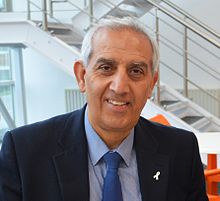Derbyshire’s police and crime commissioner Hardyal Dhindsa met with a group of local women on 19 March to discuss current concerns around their safety.
The virtual event was organised by Dr Alison Martin, Labour/Co-op candidate in Derby City Council elections who is also on Central England Co-operative’s Northern Membership & Community Council.

During the meeting, the commissioner answered women’s questions around tackling sexual abuse, domestic violence and harassment. He said he was looking at working with retail co-ops such as the Central England Co-op, which can act as safe havens for women at risk due to their longer opening hours.
In 2018 the Derbyshire Constabulary launched the Ask for ‘Angela’ campaign, encouraging anyone feeling unsafe on a night out to approach pub staff for help asking to speak to ‘Angela’ to signal that they are uncomfortable or needed help.
Dr Martin said: “Recent events have brought to the fore once again the ongoing violence and harassment that many women and girls suffer. Following the police handling of the Clapham Common vigil for Sarah Everard on 13 March, I asked Derbyshire Police and Crime Commissioner, Hardyal Dhindsa, to meet with some local women that following week. While the police can only ever be just one part of the solution to violence against women, it was important to establish that they are not part of the problem.
“We had a very informative and productive meeting with Mr Dhindsa, who set out the many strands of action Derbyshire police are taking to deal with the needs of victims, to tackle offenders and to address broader issues in the criminal justice system. The women at the meeting raised their own concerns, opinions and proposals, and there was broad agreement that much more work needs to done on the prevention of violence against women and girls, and in raising awareness of behaviour issues among men and boys.
“This is an issue that runs very deep in our society, but we can all do something to help women and girls be safer and feel safer. The co-operative movement can play its part in many ways, perhaps by running awareness campaigns via its many retail stores and promoting schemes such as the ‘Ask for Angela’ codeword in them.
“Victim support services need more funding, and would benefit from help from the Community Dividend funds. Anything co-ops can do to help develop a broader awareness of the need to prevent harassment and abuse via schools would also be welcome – even incorporating that into education programmes on cooperative values. And co-ops can look to themselves, to see where safeguarding, reporting and awareness of violence and harassment could be improved within the co-op movement.”
A similar ‘Ask for Ani’ campaign was also implemented across Derbyshire as part of a national effort to allow victims of domestic abuse to access support from the safety of their local pharmacy.
Commissioner Dhindsa also pointed out the need for criminal justice reform. He explained how the system still looks at the victim’s character, reflecting a patriarchal culture. This also impacts the way in which the media cover stories, he added.
“If women think nothing is going to happen then they won’t report it,” he said.
Elaine Dean, vice president of Central England Co-operative and Derby North Constituency Labour Party, who attended the event, said: “I am delighted that our Labour/Co-op Police & Crime Commissioner Hardyal Dhindsa gave up an hour of his busy time at short notice to speak to a group of women who want to campaign for men to stop assaulting (and worse) women on the streets and going about their lawful business and for women to feel safe going about their daily lives. This isn’t a women’s issue, it is an issue for men to address and deal with and educate their sons.”
This point was reiterated a week later by Jane Avery, president of the co-op, at an online Men’s Voices event organised by the society. She said it is time to recognise the way that men’s behaviour can harm women’s wellbeing and sense of personal safety.
Guest speaker at the event – Andy Burnham, Labour Co-op Mayor for Greater Manchester, also called for men to take greater responsibility on the issue.
He said it was also time for more open discussion on other issues such as the fact that suicide is the biggest killer for men under 50, and that a third of young men and women in Manchester have told a study they have no hope for the future.
Community relations officer James Knight said it was important for men to talk to women in their lives about their own experiences of danger on the streets, and to educate their sons to have better attitudes, and that it was part of the co-operative spirit for people to communicate and work together to improve the situation.